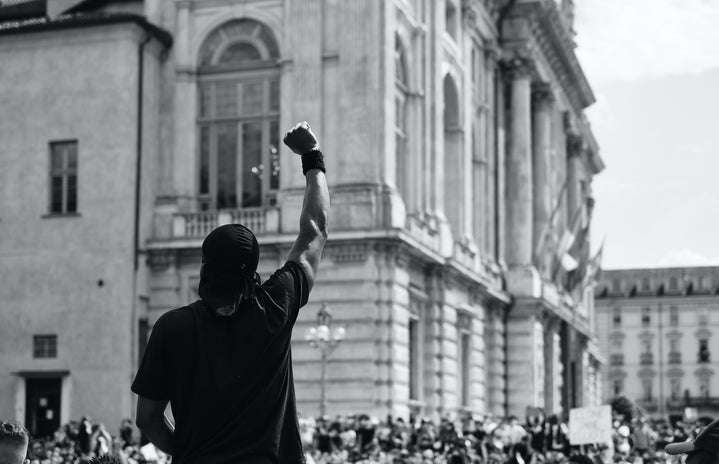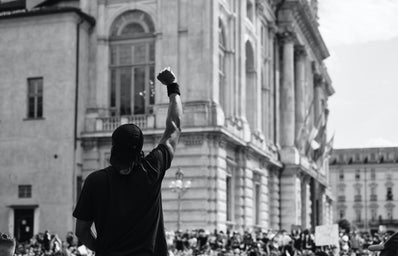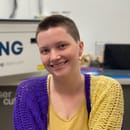I have now been to three protests in my life, and the most recent one has by far been the most impactful. I had been looking for pro-Gaza protests in the Boston area ever since I went to my first the weekend before. But I had been so far unlucky in my search.
I boarded the green line one day during the week, about to embark on an unrelated errand, when I saw two girls holding “Free Palestine” signs. I eagerly asked them if they were coming from or going to a protest, and when they shared they were heading to one, I abandoned my original errand to head there instead. It was in the same place as the one I had attended before, which is why I felt safe enough to go on a whim.
Unlike the demonstration I had been to the previous weekend, I arrived at this one as it was beginning, and I was able to see the entire thing from start to finish, which I am incredibly grateful for. The emcee began to “get the energy up” as he put it, by leading several chants. He had a kind nature about him, the way community seemed to matter to him very much made him a perfect choice for emcee. He introduced the first speaker, an artist in prose.
I will not describe her appearance for her safety and privacy, but I was incredibly moved by the power of her words. She shared that she has family in Gaza, and her grandparents had lived there all their lives before their death. The first thing she said that particularly moved me was that she was glad her grandparents had already passed, rather than for them to see what is happening in their home now. She spoke of more members of her family, that she was alienated from and how they became separated from each other due to the occupation of Gaza. She then declared, keenly aware of the language that has been used recently, that the men of Gaza’s lives are just as valuable as the women and children. The brothers, fathers, uncles, grandfathers, the men who call Gaza home deserve to live too. She characterized the attachment Palestinians in Gaza feel to their homes, and how they would be resolute in their land, to how their native tongue could never be “ripped from their body”. She spoke at times in Arabic, and though I do not know what her words were, I could feel their meaning. She continued speaking, sharing her eloquent words, while holding both the microphone and her notes in shaking hands. Her evident anxieties did not reach her voice, or diminish their impact. When tears raised the pitch of her voice, she showed that emotion is not weakness, it is power. It moved me greatly when she said that no one should have to measure their life by genocide.
She left the platform, and the emcee returned, beckoning the crowd to give her one last huge round of applause. He applauded her work vehemently, and then shared that poetry has always been an extremely important part of Palestinian resistance. He spoke of poetry with such respect, I think it could make anyone realize that their words matter too.
As the emcee and other organizers led the growing crowd in chants, several tourist buses drove by. The people looked out, and some even took pictures. Alongside Paul Revere’s house and historical relics of the past, they got to see history in the making through our demonstration for peace.
Then there was a second speaker, who again I will not physically describe for his privacy. He beckoned the crowd to imagine their own loved ones in a situation like Gaza. The faces I care about came to mind, and the notion seemed to take my breath away. However, it soon returned because I still have those faces. I can call them at any moment, hear their voice. I don’t fear every second that they will be taken from me. The people of Gaza don’t have that. Gaza needs our help so it is not reduced to a “genocide museum”, as the man with the mic tragically implied.
The voices of the crowd rang high. There were all kinds of people, from many races, genders, ages, stages of life. There were parents who brought babies, elderly who were not ready to give up their fight, signs that read “Viva Palestina!”, non-palestinian arabs, and those like me with no connection but the most important of them all: humanity, and a desperation for peace. This diversity was more prolific than I have seen in most other settings in my life, and served to create an environment of resounding unity and safety. The words we chanted: “In our millions, in our billions, we are all Palestinians!,” brought us all together in the realization that Palestinian liberation is liberation for all oppressed people, and the differences we may think we have with those suffering in Gaza are meaningless.
When the chants were over, and before our crowd turned into a marching mass, there was a pause for prayer. The emcee sang a call to prayer in Arabic. Though again I did not know the meaning of the words, I sat on the steps and listened to his soft, tender voice. After he was done, the crowd moved away from the center to create a space for anyone who wished to come forward and pray. A different man wearing a palestinian flag seemed to lead the group in an islamic prayer that began standing up and ended seated. The rest of the crowd grew completely silent and watched, forming a sort of ring around the center. It struck me that it was like we were forming a barrier around those who were worshiping and growing their relationship with Allah, silently protecting them, just by being there, from the criminalization of muslim people when they simply wanted to worship.
There were two children in the center as well, and I observed them. Their childish innocence shined through, and they fidgeted, standing when the adults crouched and crouching when the adults stood. I could not stop thinking about the children in Gaza as I watched them.
When the prayer was over, the emcee took the microphone back and thanked the rest of the crowd for being so respectful. As if it was anything more than what we should’ve done.
We then descended down the street, walking in the road. Our shouts were everywhere, different parts of the crowd saying different chants and creating a desperation in the air that wasn’t there before.
When it was finally time for me to head home, I peeled off the crowd. Standing at the entrance to the green line subway, I let out one more chant, as loud as I could, with the crowd. Then I turned, and descended down the stairs. As I did, I could still overwhelmingly hear the crowd through the walls. It sounded as though the earth itself was shouting for palestinian liberation.


